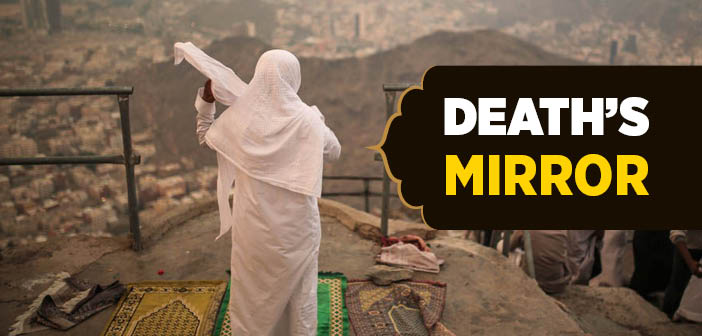What is the reckoning of human beings?
The most frightening moment for the human being at the Supreme Gathering is the time that they will be called to account. For it is then that they will be asked concerning everything they did in this trial arena of the fleeting world, and it is then that the direction of their eternal life will be determined. It is for this reason that their perturbation, anxiety and distress will reach its highest point.
A man once came to ‘Ali (may Allah be well pleased with him) and asked, “How will all the people be questioned at the same time when they are gathered for reckoning?”
‘Ali (may Allah be well pleased with him) pithily replied, “Just as Allah, glorified be He, provides them all with sustenance at the same time, He will call them to account on the Day of Judgement in exactly the same way.”[1]
There are Prophetic narrationswhich indicate that collective accounts will be settled before individual accounts. In other words, at the Place of Supreme Gathering, a caller will cry out to the people saying, “Those who have committed such-and-such sin, rise!” The perpetrators of this sin will then rise and will be humiliated before all those present at the Supreme Gathering.
Famous ascetic and judge from the generation of the Tabi’un (the successors of the Prophet’s Companions) Abu Hazim al-A’raj would on this account engage in constant self-criticism, addressing his own soul in the following words:
“O Abu Hazim! On the Day of Judgement, it will be said, ‘O those who have committed such-and-such sin!’ And you will stand up with all those who committed that same sin. Then another sin will be called, and you will stand up once again. It seems, O A’raj that you wish to stand again and again with every group of sinners!” (Abu Nu’aym, Hilya, III, 230; Imam al-Sha’rani, Ölüm Kıyâmet Âhiret, p. 152-153)
Once all collective accounts are settled, human beings will then be called to account one by one.
Ibn Abi Mulayka (may Allah be well pleased with him) relates:
Whenever ‘A’isha, the wife of the Prophet, heard something and did not understand it, she would ask again until she had grasped it.
The Messenger of Allah (may Allah bless him and grant him peace) said, “Whoever is taken to account on the Day of Reckoning will have been put to torment.”
‘A’isha (may Allah be well pleased with her) said, “Has Allah, glory be to Him, not said, ‘Then he who is given his Book in his right hand (who receives his Book in his right hand)’?”[2]
The Messenger of Allah (may Allah bless him and grant him peace) said in response, “That is but the presentment (‘ard) (of one’s deeds and not the actual reckoning). But whoever has their account thoroughly examined in Reckoning will be ruined.” (Bukhari, ‘Ilm 36, Riqaq 49; Muslim, Janna, 79, 80; Abu Dawud, Jana’iz, 1/3093)
Implied in the word ‘ard mentioned in the Narration is the presentation of people’s deeds to the Balance for weighing, or to the doers of the deeds themselves. That the reckoning on this day of presentment will be very easy for the righteous people referred to as the ‘people of the Right’ (Ahl al-Yamin), is described in the Qur’an.[3] On the Day they are called to account, the people of the Right will be given the glad tidings of forgiveness. When their deeds are presented to them, along with their shortcomings, they will also behold the great bounties they will attain. As a result, they will not experience much difficulty during the reckoning.
As for those who will not receive the glad tidings of forgiveness, their reckoning will be severe. When they discover during their questioning that many of the deeds they thought to be meritorious will not be accepted, their dispute in this regard will lead them to punishment. Else, even if eventually coming to a conclusion, this dispute will be a torment in and of itself.[4]
There is many a deed that, whether undertaken with unlawful earnings for instance, or tarnished with such corrupt qualities as hypocrisy, will not be acceptable before Allah. For this reason, for those who seek to attain the reward for these actions, these actions will instead give rise to great loss and regret in the Next World.
Allah Almighty declares in the Qur’an:
“Labouring, toiling, endlessly, roasting in a red-hot Fire.” (Al-Ghashiyya, 88:3-4)
“Say, ‘Shall I inform you of the greatest losers in their actions? People whose efforts in the life of this world are misguided while they suppose that they are doing good” (Al-Kahf, 18:103-104)
On account of this, a person’s giving their own name to the mosque, Qur’an school, or other charitable foundation that they build, for example, for the purpose of keeping their name alive, has not been looked favourably upon, as it paves the way for feelings of showing off and a desire for fame. In the words of Allah’s Messenger (may Allah bless him and grant him peace) showing off is tantamount to minor shirk, or associating partners with Allah.[5] The creed of divine unity, however, has no toleration whatsoever for any partnership. That being said, there is no harm in a building or institution bearing a benefactor’s name after their death, with the intention of their being remembered in people’s prayers, as there is no longer any opportunity for self-display or vainglory.
[1] Birgivi Vasiyetnamesi Kadızade Şerhi, p. 126.
[2] (84:7:8)
[3] Refer to Qur’an, (56:27-40, 90-91); (74:39-40).
[4] Ahmed Naîm Efendi, Tecrîd-i Sarîh Tercemesi, I, 100-101.
[5] See, Ahmad, V, 428. 429.
Source: Osman Nuri Topbaş , Journey To Eternity, Erkam Publications





